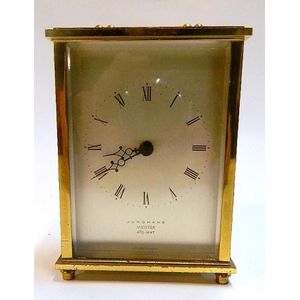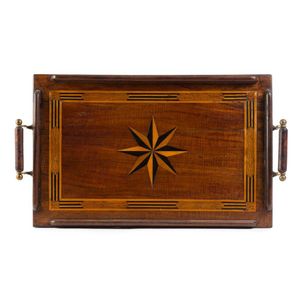Nautical Starburst Inlaid Serving Tray, 19th Century
A serving tray inlaid with nautical starburst, fiddleback blackwood, silky oak, Queensland maple, ebony and pine, 19th century 55 cm across the handles
You must be a subscriber, and be logged in to view price and dealer details.
Subscribe Now to view actual auction price for this item
When you subscribe, you have the option of setting the currency in which to display prices to $Au, $US, $NZ or Stg.
This item has been sold, and the description, image and price are for reference purposes only.
- Maple - Maple, native to North America, is a dense heavy timber from light to yellow-brown in colour. It has very little distincive graining unless it is one of the variants such as birds-eye maple or burr maple, so was not used extensively for furniture in 18th and 19th century, where cabinetmakers and designers preferred timbers with more distinctive features such as mahogany, walnut, rosewood and oak.
Birds-eye maple has a seres of small spots linked by undulating lines in the grain, is highly sough and is used as a decorative veneer. Burr maple has larger and irregular grain swirls than birds-eye maple. - Blackwood - One of the best known and most widely used Australian timbers, blackwood (acacia melanoxylon), is a member of the Acacia (wattle) family and grows in eastern Australia from about Adelaide in South Australia, as far north as Cairns in Queensland.
The largest, straightest and tallest trees come from the wet forest and swamps of north-west Tasmania where it is grown commercially.
Blackwood timber colours range across a wide spectrum, from a very pale honey colour through to a dark chocolate with streaks of red tinge.
The hardwood timber has been commonly used in the production of furniture, flooring, and musical instruments in Australia from the late 19th century. However, the straight grain timber is not the most prized or valuable, that honour falls to blackwood with a wavy, fiddleback pattern, which is used both in the solid and as a veneer. Fiddleback was only used on the finest examples of furniture. - Ebony - Ebony is a close grained timber, black in colour. It has a fine texture which can be polished to a high gloss, making it suitable for venereering, inlay and stringing and its use as solid timber is resticted to small decorative items and ornamental decoration, such as chess pieces and musical instrument parts. The term "ebonised" means "faux ebony", timber that has been darkened during the polishing process to resemble ebony.
- Oak - Native to Europe and England, oak has been used for joinery, furniture and building since the beginning of the medieval civilisation. It is a pale yellow in colour when freshly cut and darkens with age to a mid brown colour.
Oak as a furniture timber was superceded by walnut in the 17th century, and in the 18th century by mahogany,
Semi-fossilised bog oak is black in colour, and is found in peat bogs where the trees have fallen and been preserved from decay by the bog. It is used for jewellery and small carved trinkets.
Pollard oak is taken from an oak that has been regularly pollarded, that is the upper branches have been removed at the top of the trunk, result that new branches would appear, and over time the top would become ball-like. . When harvested and sawn, the timber displays a continuous surface of knotty circles. The timber was scarce and expensive and was used in more expensive pieces of furniture in the Regency and Victorian periods. - Fiddleback - A name given to the pattern of the grain in some timbers, where the lines of the grain are compressed and at the same time wavy. Fiddleback grain is prized as a timber for furniture and musical instruments, and is expensive becasue of its scarcity.
In Australia fiddleback graining is found in blackwood. Other non-native timbers that are sometimes found with a fiddleback grain are mahogany and maple.
This item has been included into following indexes:
Visually similar items

A Junghans Meister bracket clock 12 cm
Sold by
in
for
You can display prices in $Au, $US, $NZ or Stg.

Vintage 8day LOOPING gilt bedroom clock
Sold by
in
for
You can display prices in $Au, $US, $NZ or Stg.

Japanese woodblock, flowering Jonquils
Sold by
in
for
You can display prices in $Au, $US, $NZ or Stg.

A Kienzle electric clock, c. 1960s
Sold by
in
for
You can display prices in $Au, $US, $NZ or Stg.
